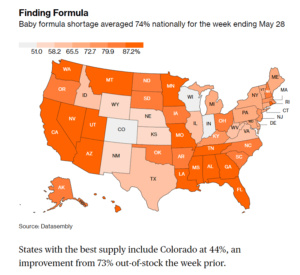Abbott Nutrition Plant Resumes Manufacturing Infant Formula.
There has been a severe shortage of infant milk formula in California and the entire United States since February 2022. Families are struggling to feed their babies, going from store to store searching for formula while shelves continue to be empty. In San Diego, CA, parents report crossing the U.S.-Mexico border to find the essential formula as they are left with no other option. Nothing is more urgent and critical than providing nourishment for our infants.
The baby formula shortage was caused mostly by the closure of a major Abbott Nutrition manufacturing plant located in Michigan in February 2022. Despite efforts from Congress and the Biden Administration, the formula out of stock rate reached critical levels at the end of May, averaging 70% nationwide and several states reaching 90% out of stock. In an article published in Bloomberg on June 2, 2022, Martine Paris included a map that shows California’s out-of-stock rate reached 93%.
This formula crisis is disproportionately affecting underserved communities, including families who participate in the Special Supplemental Nutrition Program for Women, Infants, and Children (WIC program). The WIC program has a critical role in infant nutrition and provides formula benefits for about half of the infants born in California. This formula shortage can negatively affect the health and wellbeing of thousands of babies and increases existing disparities experienced by Black and Latinx families.
Efforts
- The Abbott Nutrition plant resumed baby formula production this week, however, it may take two months or longer for all products to reach the stores.
- The White House is taking decisive steps to mitigate the crisis. The Biden Administration is working with formula manufacturers to increase production, expediting the import of infant formula from abroad, setting purchasing limits to avoid hoarding, and cracking down on unfair market practices such as price gouging. The FDA is also taking important steps to improve supply and address the shortage.
- Congress quickly and unanimously approved a bipartisan bill, The Access to Baby Formula Act, to provide flexibilities for WIC participants on the brands of formula and sizes families can access with WIC benefits.
- House Appropriations Committee Chair, Rosa DeLauro, introduced bill H.R.7790 to provide $28 million in emergency supplemental funding to increase FDA inspection capacity, prevent fraudulent products in stores, and develop better infant formula data to prevent this issue from happening again.
More is Needed
While we applaud the actions from Congress, the Biden Administration, and Federal Agency leaders, more needs to be done to fully address the problem, as Brian Dittmeier explains, “Quick action alone is not enough. Action must be complemented by a thorough accounting of how we arrived at a point where the ongoing nutrition needs of babies were put at risk.” Manufacturers were already experiencing serious supply issues due to the COVID pandemic and with the closure of one plant, the situation was aggravated. Half of all the formula sold in the US is purchased through WIC benefits and 95% of the national production is concentrated in only three manufacturers.
Developing a better support system for infant feeding is necessary to avoid future problems —including formula feeding as well as supporting, and protecting breastfeeding practices. The US is the only developed country without national paid parental leave and has yet to adopt the WHO Code, resulting in challenging situations for families who wish to breastfeed.
California WIC is working to ensure families who were limited to purchasing a specific brand, size, and product can now access a variety of options; efforts include having formula available in specialty stores and in WIC agencies by next week.
We acknowledge the challenges, fear, and frustration many parents are experiencing during this infant formula shortage. If you need resources, please visit the California Department of Public Health, CDPH WIC, and the Health and Human Services for information to share with families.
How can you help?
Please raise your voice to support the following legislation:
(S.853 / H.R.2011) Wise Investment in our Children (WIC) Act
WIC is a federally funded program that supports the health and nutritional needs of pregnant women, infants, and children up to age five. WIC serves nearly one million Californians.
- This bill would extend postpartum benefits to two years.
- Extends infant certification periods to two years.
- Extends child eligibility for nutrition benefits to age six.
Action: Ask Congress to Support the WIC Act
(S. 1658/H.R. 3110) Providing Urgent Maternal Protections (PUMP) for Nursing Mothers Act
- This bill would strengthen the Break Time for Nursing Mothers law by expanding workplace protections for lactating workers, clarifying employers’ obligations under the law, and ensuring breastfeeding mothers have access to appropriate remedies
Add your organization: Sign On Letter urging Senate Passage of the PUMP Act
SB 951 (Durazo) Increasing Wage Replacement Rates for PFL + SDI: Support
- This bill would increase the weekly Paid Family Leave (PFL) and State Disability Insurance (SDI) benefit to 90% of their regular income when they cannot work because they are caring for an ill family member, a new baby, or their own serious health condition.
Action: Visit California Work and Family Coalition




